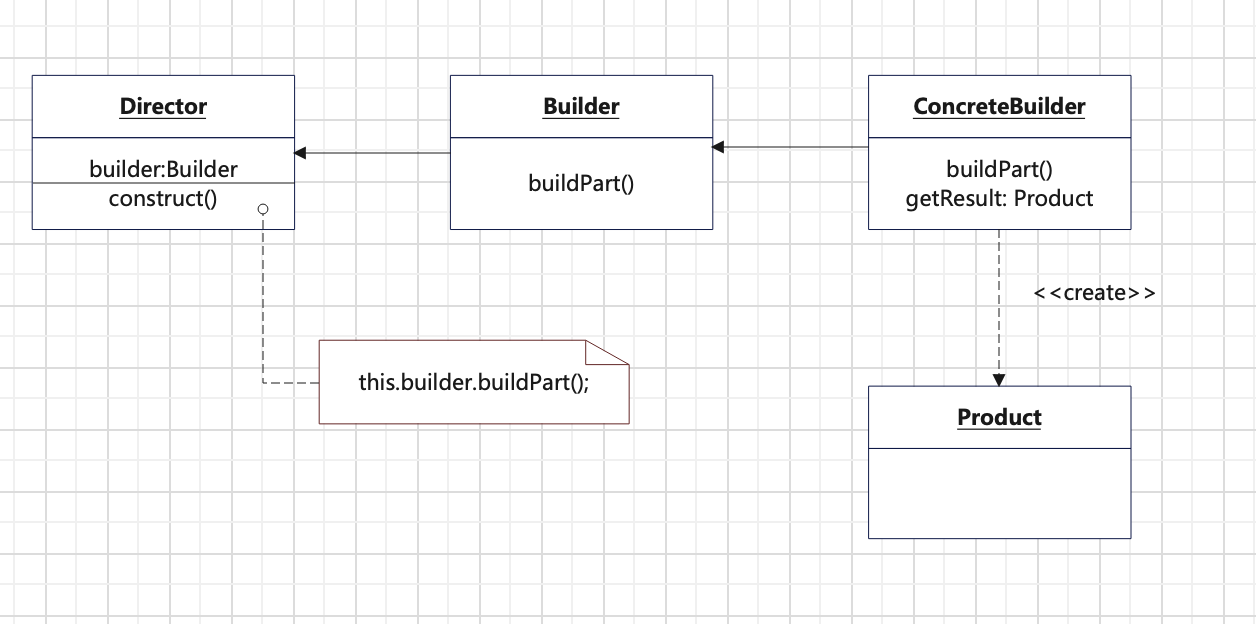建造者模式
模式定义:将一个复杂对象的创建与它的表示分离,使得同样的构建过程创建不同的表示

忽视Director、Product类,只关注建造本身
1
2
3
4
5
6
7
8
9
10
11
12
13
14
15
16
17
18
19
20
21
22
23
24
25
26
27
28
29
30
31
32
33
34
35
36
37
38
39
40
41
42
43
44
45
46
47
48
49
50
51
52
53
54
55
56
57
58
59
60
61
62
63
64
65
66
67
68
69
70
71
| public class ComputerBuilder{
private String cpu;
private String motherboard;
private String monitor;
private String keyboard;
private String mouse;
public ComputerBuilder(String cpu, String motherboard, String monitor, String keyboard, String mouse) {
this.cpu = cpu;
this.motherboard = motherboard;
this.monitor = monitor;
this.keyboard = keyboard;
this.mouse = mouse;
}
@Override
public String toString() {
return "ComputerBuilder{" +
"cpu='" + cpu + '\'' +
", motherboard='" + motherboard + '\'' +
", monitor='" + monitor + '\'' +
", keyboard='" + keyboard + '\'' +
", mouse='" + mouse + '\'' +
'}';
}
public static Builder newBuilder(){
return new Builder();
}
public static class Builder{
private String cpu;
private String motherboard;
private String monitor;
private String keyboard;
private String mouse;
public Builder() {
}
public Builder setCpu(String cpu) {
this.cpu = cpu;
return this;
}
public Builder setMotherboard(String motherboard) {
this.motherboard = motherboard;
return this;
}
public Builder setMonitor(String monitor) {
this.monitor = monitor;
return this;
}
public Builder setKeyboard(String keyboard) {
this.keyboard = keyboard;
return this;
}
public Builder setMouse(String mouse) {
this.mouse = mouse;
return this;
}
public ComputerBuilder builder(){
return new ComputerBuilder(cpu,motherboard,monitor,keyboard,mouse);
}
}
}
|
普通链式调用
1
2
3
4
5
6
7
8
9
10
11
12
13
14
15
16
17
18
19
20
21
22
23
24
25
26
27
28
29
30
31
32
33
34
35
36
37
38
39
40
41
42
43
44
45
46
47
48
49
50
51
52
53
54
55
56
57
58
59
60
61
62
63
64
65
66
67
68
69
70
71
72
73
74
75
76
77
78
79
80
81
82
83
84
85
86
87
88
89
90
91
92
93
94
95
96
97
| class Product{
private String name;
private int count;
private Double weight;
public Product(String name, int count, Double weight) {
this.name = name;
this.count = count;
this.weight = weight;
}
public Product() {
}
public String getName() {
return name;
}
public int getCount() {
return count;
}
public Double getWeight() {
return weight;
}
public void setName(String name) {
this.name = name;
}
public void setCount(int count) {
this.count = count;
}
public void setWeight(Double weight) {
this.weight = weight;
}
@Override
public String toString() {
return "Product{" +
"name='" + name + '\'' +
", count=" + count +
", weight=" + weight +
'}';
}
}
interface ProductBuilder{
ProductBuilder makeName(String name);
ProductBuilder makeCount(int count);
ProductBuilder makeWeight(Double weight);
public Product getProduct();
}
class ConcreteProductBuilder implements ProductBuilder{
private Product product = new Product();
@Override
public ProductBuilder makeName(String name) {
product.setName("can");
return this;
}
@Override
public ProductBuilder makeCount(int count) {
product.setCount(10);
return this;
}
@Override
public ProductBuilder makeWeight(Double weight) {
product.setWeight(20.0);
return this;
}
@Override
public Product getProduct() {
return product;
}
}
class ProductDirector{
public void makeProduct(ProductBuilder builder){
builder.makeName("can");
builder.makeCount(1);
builder.makeWeight(2.0);
}
}
|
应用场景:
1.需要生产的对象具有复杂的内部结构
2.需要生成的对象内部属性本身相互依赖
3.与不可变对象配合使用
优点:
1、建造者独立,亦拓展
2、便于控制细节风险
Spring源码中的应用
1
2
| org.springframework.web.servlet.mvc.method.RequestMappingInfo;
org.springframework.beans.factory.support.BeanDefinitionBuilder;
|







